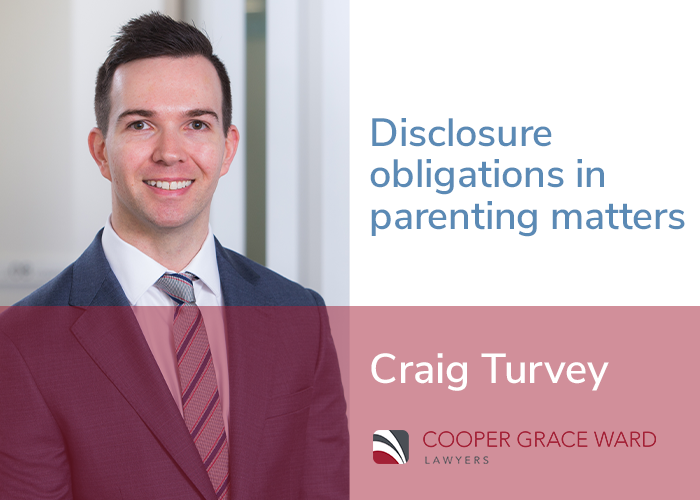In this video, CGW senior associate Craig Turvey talks about your disclosure obligations in parenting matters. These could include disclosing pending criminal charges, criminal convictions, school reports and medical reports – even if you don’t think they’re going to be great for your case.
VIDEO TRANSCRIPT
Hi, my name’s Craig Turvey, and I’m a senior associate in the Family Law workgroup at Cooper Grace Ward. Today, I’d like to talk to you about your disclosure obligations in parenting matters.
What are my disclosure obligations?
When people talk about disclosure obligations, they usually think of financial disclosure. So, bank statements, tax returns, those types of things in a financial sense. But rarely do they think of disclosure obligations in a parenting sense. So, in parenting matters in the Federal Circuit and Family Court, you’re required to provide any disclosure that’s relevant to any of the issues in the proceedings. So, that’s quite a broad sort of definition. There’s not a fixed category of documents that you need to exchange in parenting matters. But in terms of your obligations, it would include anything like, for example, if there’s any pending criminal charges, if there’s a criminal conviction, if there’s school reports or medical reports, whether about you as a parent or about your children, that might be relevant in some way. You have to disclose those things.
Do I have to disclose everything?
So, people understandably don’t generally like to disclose documents that aren’t helpful to their case. For example, if someone has a criminal conviction about something and they don’t think the other spouse might know about that, it’s not something people are usually comfortable volunteering. However, as part of your disclosure obligations, you have to do that. So, it’s often an uncomfortable discussion, having with clients to go through the sort of the checklist that lawyers do and say, look, you know, we know this might not be great for our case, but are there any in these categories of documents that might be relevant to you, for example, it might be that you suffer a mental health issue and that you received some psychological assistance from time to time and there’s a particular report about you. You might not want to provide a copy of that to your former spouse, but if it’s relevant in your parenting matter, for example, we might go to whether you have capacity to look after the children for a certain period of time, or whether there’s certain triggers, whether that’s from a domestic violence perspective or otherwise. You’re required to disclose those things as part of your obligations. Failing to do so might mean one that the court destroys particular adverse findings against you. For example, they might say that not a credible witness because you haven’t voluntarily disclosed those things. And there also might be cost implications.
So, the new rules are really focusing on people providing disclosure upfront at an early stage and again, that’s not just financial documents, but for parenting matters too. So, it may be that if you don’t disclose something and the other side or the court later finds out that there were these documents available, but you just didn’t disclose them, then they could be costs orders against you arising from that, in addition to any other adverse consequences in the proceedings. So, as uncomfortable as it might be, it’s always important to provide disclosure at an early stage and just be upfront about it.
What should I do next?
If you have any questions about your disclosure obligations in parenting matters, please don’t hesitate to contact me or one of the other family lawyers at Cooper Grace Ward.





